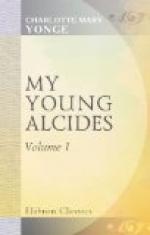To the end of their days the Misses Stympson believed that it was the convenient impersonal rumour which had maligned Harold—not themselves.
I was just parting with them when Harold appeared, and they surrounded him, with an inextricable confusion of thanks—hopes that he had not caught cold, and entreaties that he would look at his patient, whom they had brought on the back seat of the barouche to have his leg examined. Harold said that his was self-taught surgery, but was assured that the dog would bear it better from him than any one, and could not but consent.
I noticed, however, that when he had to touch the great black Newfoundland dog, a strong shudder ran through his whole frame, and he had to put a strong force on himself, though he spoke to it kindly, and it wagged its tail, and showed all the grateful, wistful affection of its kind, as he attended to it with a tender skill in which his former distaste was lost; and the party drove away entreating him to come and renew the treatment on the Monday, and asking us all to luncheon, but not receiving a distinct answer in Eustace’s absence, for he was very tenacious of his rights as master of the house.
I was quite touched with the dog’s parting caress to his preserver. “So you have conquered the birds with iron quills!” I cried, triumphantly.
“Who were they?” asked Harold, astonished.
“Surely you know them? I never thought of introducing you.”
“You don’t mean that they were those women?”
“Of course they were. I thought you knew you were performing an act of heroic forgiveness.”
Harold’s unfailing politeness towards me hindered him from saying “heroic fiddlesticks,” but he could not suppress a “Faugh!” which meant as much, and that mortified me considerably.




